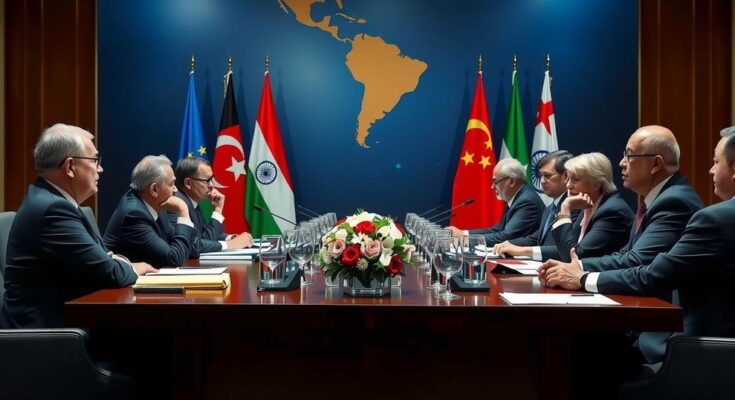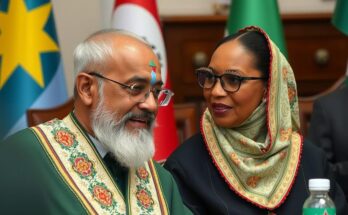This week, President Putin convened over two dozen countries at the BRICS Summit in Kazan, Russia, to discuss the establishment of a “new world order” aimed at reducing reliance on the U.S. dollar and circumventing Western sanctions. The summit highlighted the burgeoning cooperation between China and India following a recent military agreement. While Russia promotes an anti-Western agenda, member nations like Brazil and South Africa advocate for reforms in international institutions to benefit the Global South. The BRICS coalition, now representing nearly half of the global population, is increasingly positioning itself as a formidable economic bloc against Western dominance.
This week, President Vladimir Putin of Russia convened a summit involving over two dozen nations to explore the establishment of a “new world order” that is distinct from Western dominance, particularly that of the United States dollar. This year’s BRICS Summit, taking place from Tuesday to Thursday in Kazan, Russia, serves as Putin’s most significant international forum since the onset of the Ukraine invasion in 2022. The coalition aims to lessen reliance on the U.S. dollar as a strategy to circumvent Western-imposed sanctions. President Putin remarked, “The dollar is being used as a weapon. We really see that this is so. I think that this is a big mistake by those who do this.” During the summit, the leaders of China and India utilized the platform to display their aspirations for improved collaboration, particularly in light of a recent agreement to resolve their prolonged military standoff in the disputed Himalayan region. Putin stated, “Russia-China cooperation in international affairs is one of the main stabilizing factors in the world,” highlighting the significance of their partnership. India’s continued purchase of Russian oil, despite international sanctions, underscores its economic ties with Russia. The BRICS coalition, originally an acronym for Brazil, Russia, India, China, and South Africa, has expanded significantly, optimizing its collective influence by incorporating nations like Iran, Egypt, Ethiopia, the UAE, and Saudi Arabia. Several countries, including Turkey, Azerbaijan, and Malaysia, have applied for membership, indicating a growing interest in the bloc, which collectively represents approximately half of the global population and accounts for 35% of global economic output. Despite the anti-Western narrative propagated by Russia at the summit, countries such as Brazil, India, and South Africa seek to promote a less confrontational agenda. They advocate for reforms in global financial institutions like the World Bank and International Monetary Fund to better cater to the needs of developing nations. Iranian President Masoud Pezeshkian emphasized that BRICS should evolve beyond a mere “dialogue club,” lamenting the slow progress of the partnership since its inception fifteen years ago. He criticized the West’s frequent application of sanctions, stating, “It has become increasingly clear that from the perspective of Western powers, peace, democracy, prosperity, and development can only be achieved through pathways defined by them.” As the dollar’s status as the primary global reserve currency faces challenges, it currently comprises roughly 59% of global foreign reserves, a decline from 70% in 1999. Former President Donald Trump has expressed concerns that a diminished role for the dollar could lead to dire consequences, suggesting that losing its status would yield catastrophic results for the United States economy. He stated, “That would make us a Third World country. You’re losing Russia. China is out there trying to get their currency to be the dominant currency.”
The BRICS Summit represents a crucial gathering for nations seeking to reshape the global economic landscape by establishing alternatives to Western-dominated financial systems. In the wake of geopolitical tensions and economic sanctions, member countries are increasingly exploring collaborative strategies that prioritize their interests. This includes discussions on creating a unified financial system and addressing the monopolistic practices attributed to Western powers, which they argue undermine global peace and stability. Furthermore, with a growing number of countries vying for BRICS membership, the bloc’s potential to alter global economic dynamics continues to become more pronounced.
The recent BRICS Summit highlighted a pivotal moment for countries aimed at fostering an alternative economic order distinct from Western dominance. As member states intensify their efforts to collaborate and reduce reliance on the U.S. dollar, the implications for international relations and global economics are profound. While Russia champions an anti-Western stance, other members advocate for a more constructive approach that prioritizes the needs of the Global South. With ongoing discussions about financial reforms and new alliances emerging, the BRICS coalition seeks to redefine the power dynamics in the world economy.
Original Source: www.foxnews.com




